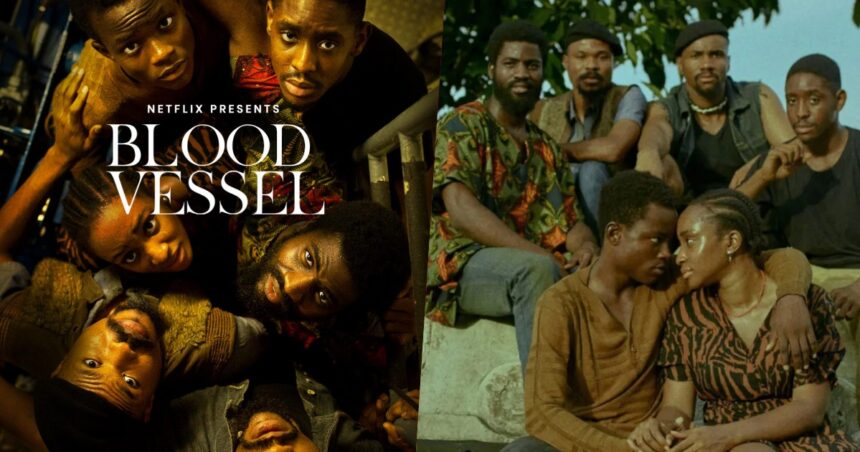Since the discovery of crude oil and petroleum in Nigeria in the late 1950s, the oil-producing states in the south-south have been a hotbed of protests, revolts, and dissent, owing primarily to the negligence of Nigerian federal governments and big oil moguls like Shell, Total, and others in these states over the years, while the inhabitants whose primary occupation is fishing are unable to earn a living due to environmental degradation and oil spillage.
The film “Blood Vessel,” directed by Moses Inwang and written by Charles Okpaleke, is set in this setting.
The film begins with an establishing image of lush green fields in Nembe, a community in Bayelsa State, where we see children play in a river over a voice note about the people’s happiness, even though they were not wealthy, until the cursed substance, crude oil, was discovered. Then the beautiful, luscious fields faded, and the river was polluted by oil spillage, killing the fish.
This scene captures the post-colonial anguish of the resource curse in most African countries, where mineral resources that are meant to improve the people’s standard of living instead compound their misery.
Following that is a youth demonstration against environmental destruction led by Boma (Jidekene Achufusi) and Degbe (Levi Chikere), as the army attempts to put an end to the protest. The two friends set an army officer on fire while simply causing an arson. In retaliation, the army arbitrarily arrests any kid in search of the killers of one of their own.
Abbey (David Ezekiel) and Oyin (Adaobi Dibor) are lovers, but Oyin’s father is overprotective of her and refuses to let her marry for fear of losing her due to his superstitious beliefs. So, when he (Bimbo Manuel) learns from his daughter, who is being kept captive for meeting her lover, that she is pregnant, he is ready to behead Abbey, whom he does not find at home. When Abbey discovers that Oyin’s father intends to send her to Warri, where the pregnancy will be aborted, he frees her and they both flee.
Olotu (Obinna Christian Okenwa) and Tekena (Sylvester Eka Nem) are two brothers who want to go to the white man’s land clandestinely. They are promised safe passage on a ship by a man named Mr. P (Francis Duru).
While rushing away from the troops, the three groups collide. The two brothers inform the others of their plan, and Boma and Degbe join them to escape from being arrested, as does Abbey, who has been falsely accused by Oyin’s father of being the leader of Boma and Degbe.
“Blood Vessel” is a postcolonial critique of Nigeria’s government’s failure to provide both economically and environmentally for the country’s prosperity, despite the country’s history of corruption and environmental damage.
The film is about foreign involvement in Nigeria’s and Africa’s overall poverty through corruption. Igor (Alex Cyr Budin), a Russian, trades in stolen Nigerian crude oil. When he arrives in Ghana, he is halted by Commander John Abe (John Dumelo), who, like his predecessor, tries to bribe him. Igor is later granted safe passage after contacting one of his influential Ghanaian pals. Later, when Igor arrives in Cabo Verde and requires safe passage, he is granted passage by Captain Jose Mendes (David Campbell), whom he bribes, even after the captain discovers that Igor is holding some Africans captive.
“Blood Vessel” is a metaphorical statement on illegal migration and its implications. The film is about the risky journey or adventure of migrants who are frightened by the sea, but in our heroes’ case, they are threatened by Igor, who represents the danger on the ship. And even if our heroes reach safely, they will be subjected to racism; Igor and his minions refer to them as ‘rats.’ “Blood Vessel” is about the disillusionment that comes with desiring to visit the land of the white man. When our heroes are apprehended halfway through the film, all they want to do is return home.
The directors, Moses Inwang and Charles Okpaleke weave and distort superstition around the plot. Because she was a gift from the water gods, Oyin is said to die if she marries or has a kid. However, the writer and director use human agency to obfuscate the metaphysical.
Despite the shallowness of the characters, the principal actors made strong performances. In the parts of Abbey and Oyin, respectively, David Ezekiel and Adaobi Dibor provided a genuine love tone to a tragic plot. Obinna Christian Okenwa, who played Olotu, the brother of Sylvester Eka Nem, who played Tekena, offered a touching story of brotherhood torn by jealousy. Jidekena Achifusi’s character, Boma, and Levi Chikere’s character, Degbe, provide humorous relief in an otherwise tense film. But Igor embodies the stereotypical image of the merciless Russian with a suspicious motif contrary to a Westerner who’s the real culprit.
“Blood Vessel” is a slow-paced crime drama with thrilling effects that uses corruption, superstition, and, of course, economic suffering to add complexity to the issue of illegal immigration.
Finally, if the film feels overly depressing, it’s because illegal immigration is a tragic enterprise that either culminates in death, as most of the major protagonists die, or physical harm, as Tekena becomes disabled.
Rating:6.5/10












